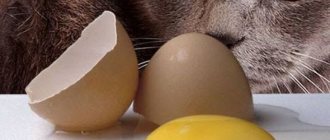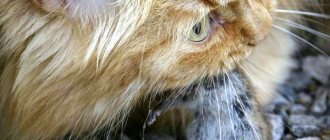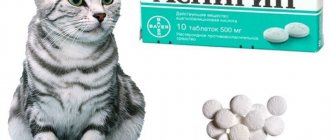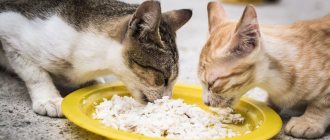10470Administration
The question of whether it is possible to feed a cat raw meat seems strange to many owners, because everyone knows that these pets are predators by nature, and no one cooks for animals in their natural habitat. In fact, a cat's intestines are perfectly adapted to process raw meat, however, it can be dangerous for the pet. Especially often, when feeding raw meat, health problems arise in show purebred cats, in which, for the sake of external appearance, little attention is paid to health, and kittens already have certain disorders at birth.
Meat is necessary for cats, as it is their main natural food. Raw meat is the best food for cats. To ensure that this product does not harm the animal, every owner must know exactly how to prepare it for giving to the pet. If everything is done correctly, then the meat will only benefit the cat and will not cause any problems to its health. Don’t forget to give your kitten raw meat, thanks to which it will develop fully.
© shutterstock
What kind of raw meat is suitable for a cat?
Not all meat can be used to feed cats. Some of its types will cause one harm to the animal, causing digestive disorders. Useful for cats :
- beef,
- goat meat,
- horsemeat,
- lean lamb,
- rabbit meat,
- chicken,
- turkey meat.
In addition, offal products, which cats eat especially readily, will also benefit the animal if fed in moderation. However, the owner must remember that their animal can be given no more than 200 g per week (the same applies to fish). You can feed your animal raw foods only if they are well tolerated. Not every cat easily digests offal.
The freshness of the meat is of great importance for the animal. The statement that cats like meat that is not quite fresh and has a smell is nothing more than a misconception. It arose because some owners simply seek to save money on animal nutrition. In fact, bad meat is just as harmful to cats as it is to humans. You should also remember that you only need to purchase proven meat for feeding your pets, which has all veterinary certificates. You can only give your cat raw meat that is fresh and without adding salt.
Quality water
The cat has a special kidney structure. At first glance, her fluid requirement is lower than that of a person, and her urine is therefore more concentrated. But your pet still needs quality water every day.
This can be bottled, spring or well water, or any purified and filtered water.
The drinking bowl should be made of stainless steel or earthenware. If it is plastic, then its quality is only acceptable, since cheap material can release harmful substances.
Find out if you can feed your cat meat. What meat is best for cats? Diet, regimen and feeding standards. Recommendations from experienced owners and veterinarians.
- What kind of meat can you give to a cat?
- What meat should you not feed your cat?
- Why raw meat can be dangerous
- How to keep meat safe
- Raw or cooked
- Video
Meat is included in a cat's diet every day. It is important for owners to know the beneficial and harmful varieties of meat, to be able to properly prepare and protect their pet from bacteria and helminths.
What kind of meat should you not give?
Not all meat can be included in a cat’s diet, even if it is of very high quality. In nature, animals can eat all types of meat and therefore hunt a wide variety of game. Domestic cats living in comfort already have a different metabolism, and therefore a number of foods can cause them harm and should not be given. A cat can get sick if its diet includes the following meat :
- pork;
- any fatty meat;
- duck;
- goose.
© shutterstock
Minced meat, especially ready-made, deserves special attention. It usually contains too much fat. In addition, such a product negatively affects the cat’s intestines and stomach, as it is not digested correctly due to its consistency.
Feeding the animal bones is also unacceptable. They are not digested in the intestines and only clog it, which can cause obstruction. They can also injure the walls of the gastrointestinal tract and lead to the death of the animal within 2-3 hours from internal bleeding.
If you decide to feed your Bengal cats natural food, then I will give you some recommendations on the types of meat. Different types of meat products have different nutritional contents and therefore different tastes.
The diet can include beef, poultry (chicken, turkey), and rabbit meat. It is better to give beef meat in finely chopped pieces, after scalding with boiling water. There is an opinion that veal is the best meat for Bengal cats, but this is not true, since the best supplier of proteins is beef with small veins, and veal also contains more water. The daily diet for a cat weighing 4-5 kg may include from 50 to 100 g of chopped beef, but not minced meat. Minced meat quickly passes through the intestines, does not stimulate its peristalsis, and therefore, there is a high probability of failure of the intestinal evacuation function, and minced meat also does not create a feeling of satiety in the animal. If you decide to pamper your pet with lamb, then the lamb should be young and lean, but it is better not to do this. It is better to completely exclude pork from the diet or feed only tenderloin very rarely and be sure to boil it first. Any fatty meat can cause VOMITING and disruption of the gastrointestinal tract, which means all sorts of problems with general health and diarrhea. Rabbit meat can be given to Bengal cats boiled and, of course, without bones, just like chicken and turkey meat. Tubular bones pose a danger to the gastrointestinal tract due to their traumatic potential. Therefore, give the meat after freeing it from the bones.
Many Bengals willingly eat liver, which contains large amounts of proteins, fats, carbohydrates and vitamins A, D, H and group B. But the liver is poor in calcium, so frequent feeding of liver, especially young animals, leads to calcium deficiency and toxicosis, as well as hypervitaminosis vitamin A. Raw liver acts on the intestines as a laxative, while boiled liver, on the contrary, strengthens it. It is not advisable to feed the liver more than once a week. The kidneys are also rich in vitamins, but before feeding they must be soaked (1 hour) and only then boiled. It is better to boil the heart, after removing the fat. Light - low in calories, therefore, low in nutrition and it is better not to use it for feeding cats. Tripe is reluctant to eat, as it is tough and has a specific smell that cats pay attention to!!!
Chistyakov Igor – Bengal Cat Cattery HILDABENG
What are the dangers of raw meat for cats?
Raw meat for a cat can pose one danger - worms. These intestinal parasites lead to a deterioration in the cat's condition. If they are not destroyed in a timely manner with the help of special preparations, there is a risk of severe intoxication in the animal, which can sometimes lead to death without urgent veterinary care.
When meat and offal go on sale, they are not checked for all parasites. The eggs of some worms are not detected due to the fact that the animal was infected shortly before slaughter and clear signs of the presence of parasites have not yet appeared.
Feeding cats raw meat should be done wisely. The product must first be prepared.
Can a cat eat beef after heat treatment?
It is widely believed that raw meat is harmful to animals due to the risk of infection by helminths and bacteria. Many owners, breeders and even veterinarians still advise processing meat before putting it in a cat's bowl.
Processing is reduced to scalding with boiling water or boiling the beef. However, scalding does not make any sense at all - such a superficial temperature effect is not capable of killing bacteria, not to mention helminth eggs. Boiling meat may be appropriate if you suspect that it is contaminated, that is, it was obtained from a sick animal.
The veterinary inspection that every cow carcass that goes on sale is subjected to virtually eliminates contamination of the meat. A cat may like boiled beef less than raw beef, and there will be less valuable substances left in it. Thus, temperature treatment is not at all necessary.
Beef is an excellent source of protein and fat when feeding cats whose owners prefer to feed at home. But you cannot give an animal only meat; the diet must be tailored to all the needs of the animal and must contain other products and additives.
How to keep meat safe
To prevent your cat from becoming infected with worms by eating meat, the product must be well prepared beforehand. The owner won’t have to do anything complicated. In order to destroy parasite eggs, their larvae and even adults, it is enough to freeze the meat for 50 hours. No matter how resilient worms are, they cannot withstand prolonged exposure to sub-zero temperatures. After cooling, the meat becomes completely safe and can be given to your cat without worrying about its health.
© shutterstock
If meat is bought at the market from an open counter, where flies that carry many diseases could land on it, it must also be processed before giving it to the cat so as not to bring infectious diseases to the pet with it. To do this, you need to pour boiling water over the product, but do not keep it in it, so that the beneficial substances in the meat are not destroyed.
Having bought meat, even in the most reliable place, it must be frozen before giving it to the cat. Due to the fact that people do not consume raw meat, the product, even if it contains eggs of a number of worms, is considered safe and goes on sale.
Pork is a source of dangerous diseases
Perhaps everyone knows that pigs often get sick and can be carriers of pathogens and parasites. This often discourages people from eating pork and pork by-products. But we must not forget that any animal living in unsanitary conditions, unvaccinated, and unkempt is also capable of getting sick. Usually such individuals are sent for slaughter and then for sale. It’s rare that any company processes such meat.
And although there is a special supervisory organization - veterinary control, there are still some nuances:
- There are still “workarounds” for obtaining the necessary documentation from veterinary control. This is especially true for small settlements.
- In a veterinary laboratory, meat products are not tested for viruses.
- Some infectious agents - viral, bacterial - die during heat treatment and are safe for people. For animals they can be very dangerous, for example, Aujeszky's virus. In order for such a pathogen to die, the meat must be boiled for at least a quarter of an hour in boiling water. Therefore, pork is given to cats only after thorough preparation.
- Pork, like all other meat and fish, is often contaminated with parasites. To become infected with helminthiasis, it is enough for one larva from raw meat to enter the body. Pork often turns out to be a source of trichinosis, and the main danger of the disease is the difficulty of diagnosis. Unfortunately, in most cases the parasite is detected when the pet can no longer be helped or after the death of the animal. The viability of the larvae depends on how long the pig has been infected. If it is dewormed, the larvae die during heat treatment. And if this procedure is neglected, then they begin to be encapsulated in muscle tissue, receiving protection from low and high temperatures. Therefore, we must not forget that trichinosis is dangerous for people, and without treatment it is fatal.
Pork is a rather specific product that causes a lot of controversy among nutritionists and veterinarians. But, if you choose it wisely, prepare it correctly and adhere to measures, then it can be included in the menu of your four-legged friend. However, when the owner doubts the quality of the product, it is better to refuse to use it.
What meat is healthier to give to a cat?
Raw meat is good for your cat's health. It contains all the amino acids and proteins necessary for the animal and ensures the proper functioning of internal organs and systems. Also, in its raw form, the product is much easier to digest by the pet’s stomach, and therefore the cat does not risk getting diseases of the digestive system.
It is strictly forbidden to give your cat fried and smoked meat. Such products will only harm the health of the animal . There is nothing useful in them for the cat, but they cause irritation of the stomach and liver. Also, if the pancreas is weak, it may also suffer.
Composition of cat food
What must be included
- Animal protein (at least 20–22%, ideally at least 35%): fresh or dried (dehydrated) poultry, beef, veal, rabbit, and in very rare cases, pork.
- By-products (at least 10%): liver, heart, etc. The exact ratio of by-products must be indicated on the packaging.
- Plant carbohydrates (minimal content): rice, barley, oats and legumes.
- Plant fiber (no more than 25%): herbs, vegetables, fruits. Carrots, zucchini, pumpkin, broccoli, asparagus, cucumbers, celery, beets, green beans, parsley, dill, lettuce, and sprouted grass are safe.
- Vitamins and minerals: taurine, vitamin B, E, unsaturated acids omega-3 and omega-6, calcium, potassium, amino acids.
- Rosemary extract as a natural preservative and antioxidant.
What should be the minimum
- Cereals and legumes: wheat, corn and soybeans. As a rule, they are used to “fill” inexpensive feeds, replacing them with other products in the premium segment.
- Synthetic preservatives E320 and E321, as well as flavoring additives.
Food for your cats on TEA.ru
What is strictly forbidden
- The following vegetables: potatoes, eggplants, tomatoes, avocados, onions and garlic, rhubarb, sorrel (can cause severe poisoning). Grapes, raisins, and persimmons are also toxic to cats.
- Cocoa beans, cocoa, chocolate. They contain theobromine, which is incredibly beneficial for humans, but very dangerous for cats.
- Salt.
Is it possible to combine raw and cooked meat?
It’s not uncommon for owners to give their cats not only raw, but also boiled food, since many pets eat cooked meat more readily. Boiled meat contains enough nutrients for a cat, and if desired, you can feed it such a product in combination with raw meat, but only without combining them in one feeding.
The fact is that if a cat eats raw and cooked meat at the same time, then in order to digest two dishes at once, the production of different enzymes will be required. This can overload the cat's digestive system, causing diarrhea or vomiting. The interval between giving food should be at least 3 hours.
© shutterstock











